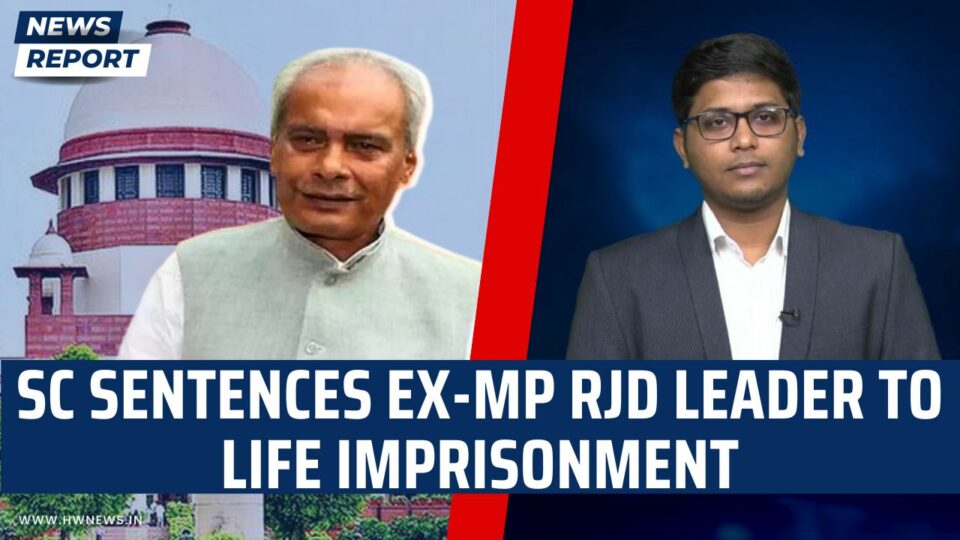On Friday, the Supreme Court sentenced Prabhunath Singh, a leader of the Rashtriya Janata Dal (RJD) and a former Member of Parliament (MP), to life imprisonment for his involvement in a double murder case from 1995. This decision came shortly after the court reversed his earlier acquittal, attributing it to the failure of the state machinery and the trial court to ensure a fair trial. Prabhunath Singh has been a member of the 12th, 13th and 14th Lok Sabha. He represented the Masrakh Assembly Constituency from 1985 to 1995, and the Maharajganj Lok Sabha constituency of Bihar from 1998 to 2009. In 2013, Prabhunath Singh won the bypoll and remained a Member of Parliament until 2014. A bench of justices, namely Sanjay Kishan Kaul, AS Oka, and Vikram Nath, also ordered Prabhunath Singh and the Bihar government to provide financial compensation. They were instructed to pay ₹10 lakh each to the families of the two deceased victims and ₹5 lakh each to an injured victim in the case. Prabhunath Singh, who is already serving a life sentence in another murder case, participated in the proceedings via virtual means from Hazaribagh jail in Jharkhand. In 2017, a trial court found Prabhunath Singh guilty of his involvement in the 1995 murder of legislator Ashok Singh, who had defeated him in the 1995 Bihar assembly poll. Notably, Prabhunath Singh had issued threats to eliminate Ashok Singh within 90 days of the election results. During the sentencing phase, senior advocates Abhishek Manu Singhvi and R Basanth, representing Prabhunath Singh, implored that their client should not receive the death sentence. They argued that this case did not meet the criteria for the “”rarest of rare”” offenses. They also pointed out that the Supreme Court had already overturned his acquittals in two lower courts, and a review petition had been filed on August 18. In its August 18 judgment, the Supreme Court expressed deep concern over the failures of the key participants in the criminal trial, including the Investigating Officer, the public prosecutor, and the judiciary. The court lamented their collective failure to fulfill their respective duties and responsibilities. On that same day, the Supreme Court ruled that there was sufficient evidence to establish that Prabhunath Singh had murdered Rajendra Rai (18) and Daroga Rai (47) near a polling booth in Chhapra in March 1995. The motive for the killings was their failure to vote according to Singh’s instructions. Due to allegations of witness intimidation and influence, the case was transferred from Chhapra to the Patna High Court. In December 2008, a Patna court acquitted Singh, citing a lack of evidence. This acquittal was upheld by the Patna High Court in 2012. However, Rajendra Rai’s brother challenged the acquittal in the Supreme Court. In its August 18 judgment, the Supreme Court emphasized that the investigation had been compromised, highlighting Prabhunath Singh’s abuse of power as a prominent sitting MP of the ruling party. The court criticized the prosecution, the trial court, and the Patna high court for overlooking crucial evidence, including the dying declaration of Rajendra Rai and the eyewitness account of his mother. It condemned the “”deplorable functioning”” of the public prosecutor, police administration, and the presiding officer of the trial court. However, the court upheld the acquittal of six other co-accused individuals due to insufficient evidence.
#RJD #SupremeCourt #Bihar #PrabhunathSingh #JDU #NitishKumar #LaluPrasadYadav #TejashwiYadav #BiharCrime #BiharJharkhand #HWNews
As an independent media platform, we do not take advertisements from governments and corporate houses. It is you, our readers, who have supported us on our journey to do honest and unbiased journalism. Please contribute, so that we can continue to do the same in future.

